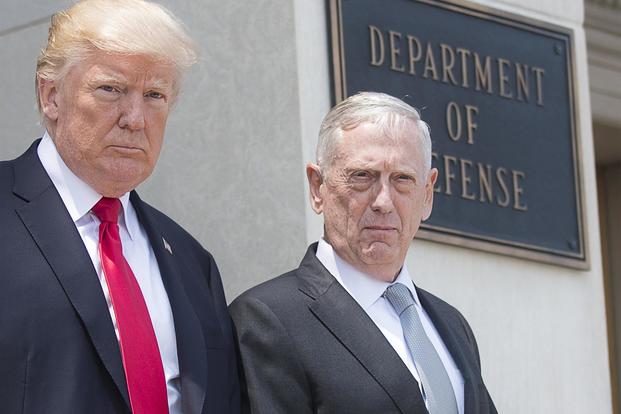President Donald Trump declared U.S. recognition of Jerusalem as Israel's political capital Wednesday and pledged to move the U.S. Embassy there eventually despite the concerns of Defense Secretary Jim Mattis that the move could trigger violence in the region and put U.S. troops at risk.
Both Mattis and Secretary State Rex Tillerson laid out their views to Trump at a White House meeting last week, Defense and State Department officials said.
As he returned to Washington from a five-day trip to the Mideast and South Asia Tuesday, Mattis told reporters that the discussions on Jerusalem "went on for some time." He declined to characterize what he told Trump. "As always, my advice to the president I keep confidential."
However, Mattis said, "I gave to the president what I thought. You have to look at the world in different parts and pieces too. So, as you do that, you have to have a lot of information. I collected the information. I made my recommendation, and I'll just leave it at that."
In his Senate confirmation hearing in January, Mattis firmly declared that Tel Aviv was the capital of Israel. He also said he backed a two-state solution to the Israeli-Palestinian conflict.
"The capital of Israel that I go to, sir, is Tel Aviv, sir, because that's where all their government people are," Mattis said in response to questions on whether Jerusalem should be recognized as the capital by the movement of the U.S. Embassy to Jerusalem was a matter for the Secretary of State, Mattis said at the time.
Ahead of Trump's announcement Wednesday, Palestinians in the Gaza Strip burned U.S. flags and photos of Trump. In Amman, members of the Jordanian parliament protested at the U.S. Embassy.
At the Pentagon, Army Col. Rob Manning, a spokesman, said that the Defense Department was working with the State Department's Bureau of Diplomatic Security to guard against threats to U.S. Embassies worldwide.
"We are protecting our embassies" with bolstered Marine guard security and Marine FAST teams [Fleet Anti-Terrorism Security Teams) on alert, he said.
Without giving specifics, Manning also said the department was taking additional "steps to mitigate" the potential risk.
"We're always postured for a range of threats," he said.
Manning added he was "not aware of any specific order" to U.S. troops in Iraq, Syria and Afghanistan to take precautions in the event of repercussions from Trump's declaration, which has drawn widespread condemnation in the region as an affront to Muslims.
In response to questions on the FAST teams, Lt. Col. Mike Andrews, a Pentagon spokesman, said, "Due to operational security, I won't get into specifics, but the Department of Defense takes necessary steps to mitigate threats to U.S. personnel and interests around the world."
In his White House address, Trump said recognizing Jerusalem as the capital was "the right thing to do," and he criticized his predecessors -- Presidents Bill Clinton, George W. Bush, and Barack Obama -- for failing to make the move previously.
"Some say they lacked courage," Trump said, "but they made their best judgments based on the facts as they understood them at the time."
"Today, we finally acknowledge the obvious -- that Jerusalem is Israel's capital," the president said. "This is nothing more or less than a recognition of reality. It is also the right thing to do."
Trump stressed "this decision is not intended in any way to reflect a departure from our strong commitment to facilitate a lasting peace agreement." He made no mention of Palestinian hopes to have their capital in East Jerusalem.
In his own address following Trump's, Palestinian President Mahmoud Abbas warned the Jerusalem declaration could encourage "extremist organizations to wage a religious war that would harm the entire region, which is going through critical moments and would lead us into wars that will never end, which we have warned about and always urged to fight against."
Trump's action drew a mixed response on Capitol Hill. Sen. Jack Reed, D-Rhode Island, the ranking member of the Senate Armed Services Committee, called the move "another diplomatic blunder and unforced error by President Trump."
He said that Trump’s Jerusalem statements "could trigger a backlash against Israel and American interests and personnel overseas."
Sen. Joni Ernst, R-Iowa, a SASC member, said Trump was only "following through on a promise made by many U.S. presidents in the past."
Later Wednesday, the White House issued a presidential proclamation on Trump's earlier action:
"The foreign policy of the United States is grounded in principled realism, which begins with an honest acknowledgement of plain facts."
"With respect to the state of Israel, that requires officially recognizing Jerusalem as its capital and relocating the United States Embassy in Israel to Jerusalem as soon as practicable."
In a background briefing Tuesday night, White House officials, speaking on grounds of anonymity, said that arrangements to move the embassy to Jerusalem could take several years.
-- Richard Sisk can be reached at Richard.Sisk@Military.com.













